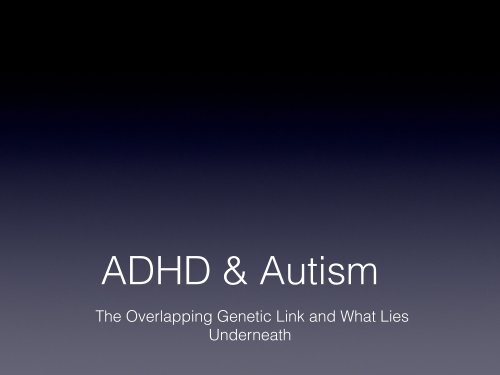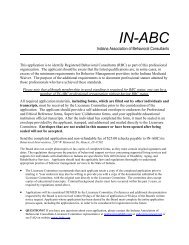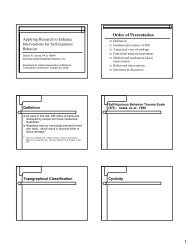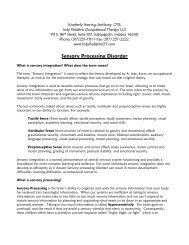ADHD and Autism Spectrum Disorders - Autismconsultingservices ...
ADHD and Autism Spectrum Disorders - Autismconsultingservices ...
ADHD and Autism Spectrum Disorders - Autismconsultingservices ...
Create successful ePaper yourself
Turn your PDF publications into a flip-book with our unique Google optimized e-Paper software.
<strong>ADHD</strong> & <strong>Autism</strong><br />
The Overlapping Genetic Link <strong>and</strong> What Lies<br />
Underneath
Learning Objectives:<br />
• Present key medical research that powerfully<br />
demonstrates a genetic overlap between <strong>ADHD</strong>/<br />
<strong>Autism</strong> <strong>and</strong> implications<br />
• Provide a shift in perspective on adult <strong>ADHD</strong><br />
challenges <strong>and</strong> create a picture of what<br />
empowering from a place of strength looks like.<br />
• Introduce the "Attention Model" <strong>and</strong> demonstrate<br />
its effectiveness through the skill of "Attending".<br />
• Apply the use of attending for our clients to<br />
develop <strong>and</strong> implement sensory strategies that<br />
creates focus, motivation, <strong>and</strong> follow-through
More than 50% of children with <strong>ADHD</strong><br />
meet the diagnostic criteria for autism<br />
spectrum disorders.
More than 50% of children with <strong>ADHD</strong><br />
meet the diagnostic criteria for autism<br />
spectrum disorders.<br />
<br />
It is estimated that 30 to 80% of children<br />
with autism have <strong>ADHD</strong>
<strong>ADHD</strong>:<br />
Inattention<br />
Hyperactivity<br />
Impulsivity
<strong>Autism</strong>:<br />
Social interaction<br />
Communication<br />
Repetitiveness
Subtle behavioral differences...<br />
Which one is it
Hyperactive child experiencing anxiety due to sudden<br />
changes in his environment.<br />
VS.<br />
Hyperactive child needing to release energy
<strong>Autism</strong> <strong>and</strong> <strong>ADHD</strong> showing up in the<br />
same families <strong>and</strong> showing aggression<br />
<strong>and</strong> general disruptive behavior
Researchers<br />
started<br />
digging in<br />
<strong>and</strong> found<br />
clues !
"There is a lot more to discover about<br />
the genetics of both conditions."<br />
Philip Asherson, Prof. of Molecular Psychiatry, Kings College,<br />
London, Engl<strong>and</strong>
More than half of the genes in one condition also<br />
influenced the other condition
Individuals with <strong>ADHD</strong> score higher on<br />
tests for autism-like symptoms than do<br />
their siblings or "healthy" controls.
Individuals with <strong>ADHD</strong> score higher on<br />
tests for autism-like symptoms than do<br />
their siblings or "healthy" controls.<br />
Male siblings of children with <strong>ADHD</strong><br />
score higher on the tests than do<br />
children in the general population.
Researchers collected DNA<br />
<strong>and</strong> behavioral data...
Researchers collected DNA<br />
<strong>and</strong> behavioral data...<br />
248 children with <strong>ADHD</strong>
Researchers collected DNA<br />
<strong>and</strong> behavioral data...<br />
248 children with <strong>ADHD</strong><br />
349 children with autism
22 kids with <strong>ADHD</strong> had a copy number variation<br />
not found in "healthy" kids <strong>and</strong> five of those kids<br />
had copy number variations that also appeared in<br />
nine kids with autism.
22 kids with <strong>ADHD</strong> had a copy number variation<br />
not found in "healthy" kids <strong>and</strong> five of those kids<br />
had copy number variations that also appeared in<br />
nine kids with autism.<br />
A mutation in the gene ASTN2 found in the<br />
development of neurons reveals more...
"Clearly these are genes that affect the development of<br />
the brain. But why changes in these genes would be<br />
shaped into one disorder in one person <strong>and</strong> a different<br />
disorder in another person is going to be a question for<br />
a long time, I'm sure."<br />
Russell Schachar, Senior Scientist of Psychiatry at the Hospital<br />
for Sick Children, Toronto, Canada
What do we conclude<br />
• The studies indicate literally hundreds of genes at<br />
play in autism <strong>and</strong> a different combination could be<br />
at the root of each child's case.
What do we conclude<br />
• The studies indicate literally hundreds of genes at<br />
play in autism <strong>and</strong> a different combination could be<br />
at the root of each child's case.<br />
• Diagnostic labels limit our ability to<br />
underst<strong>and</strong> <strong>and</strong> intervene on behalf of<br />
<strong>ADHD</strong> <strong>and</strong> autistic individuals
What do we conclude<br />
• The studies indicate literally hundreds of genes at<br />
play in autism <strong>and</strong> a different combination could be<br />
at the root of each child's case.<br />
• Diagnostic labels limit our ability to<br />
underst<strong>and</strong> <strong>and</strong> intervene on behalf of<br />
<strong>ADHD</strong> <strong>and</strong> autistic individuals<br />
• Finding the genetic beacons <strong>and</strong> brain<br />
pathways they control will eventually help us<br />
target better treatments.
Beyond the labels:<br />
• New perspective on the challenges facing<br />
adults with <strong>ADHD</strong>
Beyond the labels:<br />
• New perspective on the challenges facing<br />
adults with <strong>ADHD</strong><br />
• Adult <strong>ADHD</strong> in a place of strength
Beyond the labels:<br />
• New perspective on the challenges facing<br />
adults with <strong>ADHD</strong><br />
• Adult <strong>ADHD</strong> in a place of strength<br />
• What's underneath the label
Beyond the labels:<br />
• New perspective on the challenges facing<br />
adults with <strong>ADHD</strong><br />
• Adult <strong>ADHD</strong> in a place of strength<br />
• What's underneath the label<br />
• Interventions
What does the general public conclude in<br />
their minds when they hear these three<br />
descriptive words<br />
Inattention<br />
Hyperactivity<br />
Impulsivity
<strong>ADHD</strong>:<br />
A challenge of attention
<strong>ADHD</strong>:<br />
A challenge of attention<br />
A challenge of interest
<strong>ADHD</strong>:<br />
A challenge of attention<br />
A challenge of interest<br />
<br />
A challenge of integrity
The "Attention Model"
"The intuitive mind is a sacred gift <strong>and</strong> the rational<br />
mind is a faithful servant. We have created a society<br />
that honors the servant <strong>and</strong> has forgotten the gift."<br />
Albert Einstein
Attending:<br />
Paying attention...<br />
Huh<br />
...to what is being<br />
paid attention to.
"I just want to hit the ball. "<br />
8-year-old boy
The skill of<br />
"attending"<br />
applied:<br />
Allow me to introduce<br />
you to Bob!
Inattentive <strong>and</strong> unaware<br />
Forgetful, Mind Drifting<br />
"Oh, I<br />
forgot!"<br />
Excessive attention to nonproductive<br />
activity with<br />
repetition
• How do we raise Bob's awareness so he can focus<br />
• How do we increase interest in other areas of Bob's<br />
life where responsibility is required<br />
• How do we create motivation necessary to help<br />
Bob repetitively follow through on his daily living<br />
tasks
Bob :<br />
The replacement behavior goal<br />
The replacement behavior objective
Bob :<br />
What lies underneath<br />
The replacement behavior procedure
Strategic uses of Bob's unique<br />
sensory profile
Internalizing the replacement behavior:<br />
Answering the question "Who"
Resources used:<br />
"<strong>Autism</strong>, <strong>ADHD</strong> share genetic similarities" http://www.foxnews.com/health/<br />
2011/08/11/autism-adhd-share-genetic-similarities/<br />
"<strong>ADHD</strong>, autism may sometimes share gene mutations" http://<br />
health.usnews.com/health-news/family-health/brain-<strong>and</strong>-behavior/articles/<br />
2011/08/10/adhd-autism-may-sometimes-share-gene-mutations<br />
"<strong>ADHD</strong> <strong>and</strong> autism: Is it in the genes" http://www.everydayhealth.com/addadhd/adhd-<strong>and</strong>-autism-is-it-in-the-genes.aspx<br />
"Researchers probed genetic overlap between <strong>ADHD</strong> <strong>and</strong> autism" http://<br />
sfari.org/news-<strong>and</strong>-opinion/news/2010/researchers-probe-genetic-overlapbetween-adhd-autism<br />
"Evaluating Dopamine Reward Pathway in <strong>ADHD</strong>: Clinical Implications" Nora<br />
Valkow, MD, www.jama.jamanetwork.com/article.aspxarticleid=184547
Resources used (continued):<br />
"<strong>Autism</strong> <strong>and</strong> <strong>ADHD</strong> in children: is there a genetic overlap" http://<br />
www.babble.com/kid/child-development/autism-adhd-causes-geneticbasis-2/<br />
"<strong>Autism</strong> <strong>and</strong> <strong>ADHD</strong> shared genetic similarities" http://<br />
www.myhealthnewsdaily.com/1570-autism-adhd-share-genetic-similarities.htm<br />
"ADD Coach Academy: Transforming the ADD perspective", Coaching<br />
school manual, www.ADDCA.com<br />
"So, Who Programmed U" Manual, Jeff Copper, MBA, Dig Coaching<br />
Practice, www.digcoaching.com<br />
"Coaching the World's Brains to Empower Human Global Gains", David<br />
Giwerc, MCC, www.ADDCA.com<br />
"Fidget to Focus Outwit your Boredom: Sensory Strategies For Living with<br />
ADD" Rotz, Ph.d & Wright, M.S., ACT, www.fidgettofocus.com





